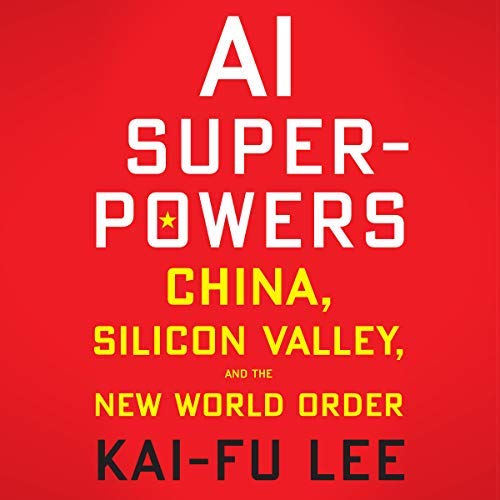Massive Data, AI Companies to Fuel China’s Advance
The book “AI Superpowers: China, Silicon Valley, And The New World Order,” tackles explaining the origins and growth of artificial intelligence and how China has positioned itself to become the next great world power by leveraging its all-in commitment to investing in and promoting its AI development.
Mentioning China first was intentional—even the cover of the book with its Communist red mimics the Chinese flag with a yellow typeface that evokes the yellow stars on the top left corner. Red is also the color of happiness, success and good fortune for the Chinese.
Kai-Fu Lee, the author, writes at length about his years as president of Google China and how Google and other American companies failed to adapt to a cutthroat competitive culture that developed within the outlaw business environment long unfettered by copyright concerns and rife with propaganda wars against the competition. Now chairman/CEO of Sinovation Ventures, a technology investment firm, Lee writes from the shrewd perspective of a VC who sees the future—and it is dominated by China. (On Sunday, 60 Minutes featured Lee’s views on how AI will displace an estimated 40% of jobs within 15 years across all business sectors and levels.)

Dr. Kai-Fu Lee, author of AI Superpowers, and CEO of Sinovation Ventures.
The details of how internet companies developed in China are the most fascinating part of the book to anyone who hasn’t had a front row seat to the virtual street fighting that put a few entrepreneurs on top. Most began as “copycats” of American web companies, from imitating Google to copying Ebay, Facebook, Twitter, Amazon, Paypal and Yelp. Only in 2013 did those companies begin to innovate, making new products and creating new functionality on apps that American companies have yet to catch up on. Chinese companies create “super apps” that have multiple functionalities, for instance, while American companies tend to keep apps functioning for one purpose.
“in effect, WeChat has taken on the functionality of Facebook, iMessage, Uber, Expedia, eVite, Instagram, Skype, PayPal, Grubhub, Amazon, LimeBike, WedMD, and many more,” Lee explains. Chinese people pay for almost everything through their phones, another difference in their adaptation that just hasn’t occurred in the United States.
China’s “AI fever” began raging within the country only in the past few years, according to Lee. The ability of Google’s Alpha Go to beat the country’s top Go player electrified the public and turned into the “Sputnik moment” in 2016 when the government began to understand the potential of the power of the technology and to put resources toward its advancement.
Lee, who earned a Ph.D. at Carnegie Mellon University in artificial intelligence way back in 1986, pursued the field even though it was stuck in a rut because neural net learning was out of fashion and rules-based AI was promoted. He explained that it wasn’t until the mid-2000s when Gregory Hinton discovered a way to efficiently train new layers in neural networks that they again returned to the forefront. With the advancement of computing power and the wealth of data available, the systems lunged forward in the ability to perform tasks like speech and object recognition.
The United States, Canada and the United Kingdom invested in AI research early on, and companies like Google, Facebook and Apple put resources into technology like speech recognition and self-driving cars, AR, VR and drones.
Considering that the United States still has seven of the largest technology companies in the world, it hasn’t yet lost its dominance as an AI juggernaut—Lee just anticipates that it will. While China has grabbed the lead from America in the realm of machine learning largely due to its massive stores of data, when it comes to innovation in AI development, Lee acknowledges that American companies still hold several advantages.
The first mover advantage of Google in terms of attracting some of the most brilliant thinkers and programmers positions it to develop technologies that no one has yet imagined—and to single-mindedly pursue ideas that might not pay off financially for decades. “In terms of funding, Google dwarfs even its own government: U.S. federal funding for math and computer science research amounts to less than half of Google’s own R&D budget.”
Among Lee’s projections are that we will shift to an OMO existence: online-merge-offline. “AI will turn shopping malls, grocery stores, city streets, and our homes into OMO environments.” We will be able to talk to virtual assistants everywhere, for instance, and they will have information about us that can be used to assist us.
Lee notes that at a KFC in China that teamed up with Alipay, customers place orders at a digital terminal, it scans their face (which is connected to their Alipay account) and the transaction is done. Lee shops at the Yonghui grocery store where the shopping carts scan his face and greet him, then display a list of the items he typically purchases on a screen on the cart.
“My refrigerator and cabinets have already detected what items we’re short on this week, and they automatically ordered the nonperishable staples—rice, soy sauce, cooking oil—for bulk delivery,” Lee writes. “That means grocery stores like Yonghui can tailor their selection around the items you’d want to pick out for yourself: fresh produce, unique wines, live seafood. It also allows the supermarkets to dramatically shrink their stores’ footprint and place smaller stores within walking distance of most homes.”
Lee addresses the downsides of AI, most notably widening the divide between the haves and have-nots and the tendency of AI to perpetuate inequities based on data. While he agrees that social and economic disruption in the workforce will occur, he said he believes that governments can mitigate it and only through people-based policies, such as universal income and a focus on machines helping people, will AI reach its potential as a technology that benefits humankind.
A chapter in the book about his cancer diagnosis, treatment and remission, shows how Lee began to look at our AI future differently, not as a series of technological breakthroughs, but as a continuum of human development.
“This near-death experience also gave me a new vision for how humans can coexist with artificial intelligence. Yes, this technology will both create enormous economic value and destroy an astounding number of jobs. If we remain trapped in a mindset that equates our economic value with our worth as human beings, this transition to the age of AI will devastate our societies and wreak havoc on our individual psychologies.”
Lee concludes that we must use AI to create “a more loving society.” He warns that focusing on an AI race creates a winner and loser, and instead says we should focus on using
AI for creation, instead of destruction. He asserts, “We are not passive spectators in the story of AI—we are the authors of it.” We will determine how to best use it to improve lives, “working across class boundaries and national borders to write our own ending to the AI story.”








Leave A Comment